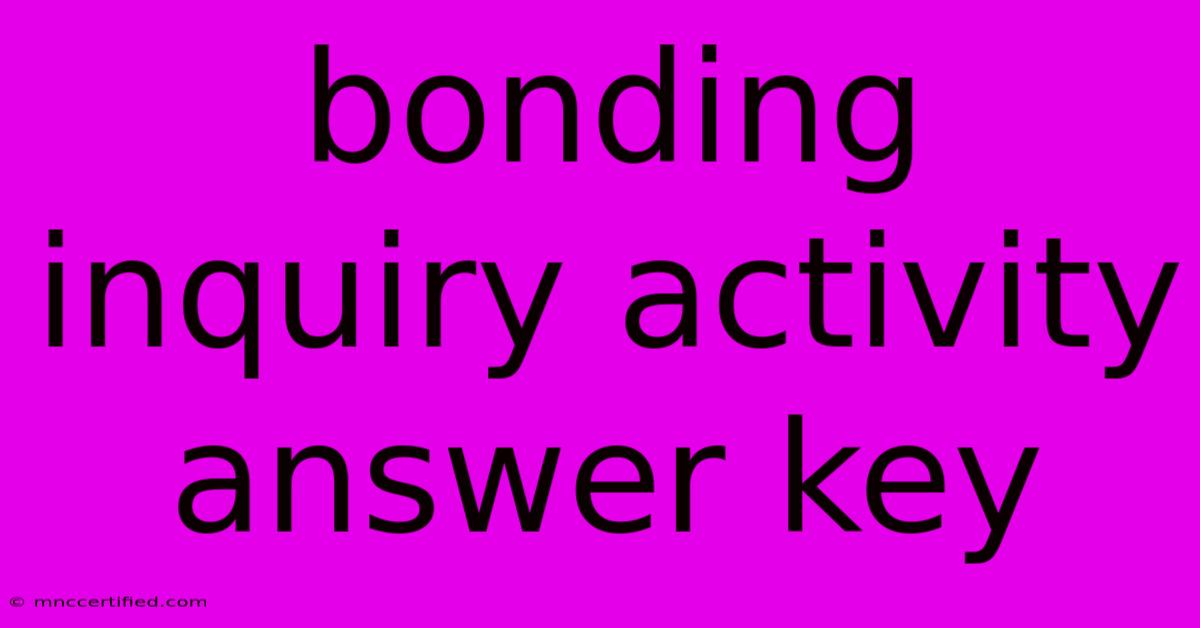Bonding Inquiry Activity Answer Key

Table of Contents
Unlock the Power of Bonding: Inquiry Activities and Their Answers
Bonding inquiry activities are a fantastic way to engage students in the learning process and deepen their understanding of chemical concepts. These activities encourage critical thinking, problem-solving, and a deeper exploration of the subject matter. But, sometimes, even the best inquiry activities can leave students with unanswered questions.
That's where having an answer key comes in handy. It provides teachers and students with a clear understanding of the expected outcomes and allows for valuable discussions and reflections. Today, we'll delve into the world of bonding inquiry activities and explore how to use answer keys effectively.
Why Use Bonding Inquiry Activities?
Bonding inquiry activities offer several advantages:
- Active Learning: Students become active participants in the learning process, leading to deeper comprehension and better retention.
- Critical Thinking: They promote critical thinking skills by encouraging students to analyze data, draw conclusions, and formulate explanations.
- Problem-Solving: Inquiry activities help students develop problem-solving skills through investigation, experimentation, and data analysis.
- Collaboration: Many inquiry activities are designed to be collaborative, fostering teamwork and communication skills.
Different Types of Bonding Inquiry Activities
There are various types of bonding inquiry activities you can use, each with its unique focus:
- Modeling Activities: These activities involve building models of different types of bonding, like ionic or covalent bonds.
- Data Analysis Activities: Students analyze data sets related to bond lengths, bond energies, or other properties.
- Simulation Activities: These activities use simulations to explore bonding concepts virtually, allowing students to manipulate variables and observe their effects.
- Research Projects: Students delve into research to learn about specific types of bonding or the applications of bonding in different fields.
The Importance of the Answer Key
While inquiry activities emphasize independent thinking and exploration, having an answer key is crucial for:
- Validation: The answer key provides a point of reference to validate student conclusions and correct any misconceptions.
- Guidance: It can guide students towards a deeper understanding of the topic by providing explanations and insights.
- Assessment: The answer key allows teachers to assess student understanding and identify areas that need further explanation.
Tips for Using Answer Keys Effectively
Here are some tips to maximize the benefits of answer keys:
- Use the answer key sparingly: Encourage students to attempt the inquiry activity independently before referring to the key.
- Discuss the answers: Use the answer key as a starting point for open discussions, allowing students to explain their reasoning and learn from each other.
- Focus on the process: Emphasize the importance of the inquiry process, even if students don't get all the answers right.
- Adapt the answer key: Feel free to modify the answer key based on your students' needs and the specific learning objectives of the activity.
Finding and Creating Answer Keys
You can find a plethora of bonding inquiry activities online with corresponding answer keys. Many educational websites, textbook publishers, and teachers share their resources.
If you're looking to create your own inquiry activity, consider these steps:
- Identify the learning objective: Determine the specific concepts you want students to understand.
- Develop the activity: Create a question, problem, or task that encourages student investigation.
- Craft the answer key: Provide detailed explanations, solutions, and supporting evidence for each question or task.
Conclusion
Bonding inquiry activities are a valuable tool to enhance student learning. By using them effectively and incorporating answer keys strategically, you can foster a deeper understanding of chemical bonding while nurturing critical thinking and problem-solving skills. Remember, the goal is to guide students towards independent learning and discovery, using the answer key as a resource for validation and clarification.

Thank you for visiting our website wich cover about Bonding Inquiry Activity Answer Key. We hope the information provided has been useful to you. Feel free to contact us if you have any questions or need further assistance. See you next time and dont miss to bookmark.
Featured Posts
-
Camillas Documentary Aids Abuse Survivors
Nov 12, 2024
-
Elise Stefanik New Un Ambassador Tom Leads Border Security
Nov 12, 2024
-
Jerry Jones Curtains At At And T Stadium
Nov 12, 2024
-
Tesla Share Price Forecast 1 Trillion Market Cap
Nov 12, 2024
-
Gary Lineker Exits Match Of The Day After Controversy
Nov 12, 2024